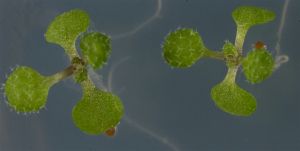- La regulación de la señalización mediada por ácido jasmónico es clave para mantener el equilibrio entre crecimiento y defensa
- Las proteínas BPM regulan la degradación de los factores de transcripción que activan la respuesta inmune.
La supervivencia de las plantas en la naturaleza requiere su adaptación a diferentes tipos de estrés medioambiental. A diferencia de los animales, las plantas no tienen posibilidad de escapar cuando se enfrentan a una agresión externa como la mordedura de un insecto. Por este motivo, han desarrollado mecanismos de señalización interna y respuesta a través de hormonas como el ácido jasmónico. Sin embargo, la respuesta desencadenada por esta hormona frena el crecimiento de la planta para centrar los recursos en la defensa. Así, un exceso de acción de esta hormona puede afectar al desarrollo vegetal, por lo que su señalización debe estar regulada de una manera muy precisa en tiempo e intensidad.
Ahora, investigadores del Centro Nacional de Biotecnología (CNB) pertenecientes al Consejo Superior de Investigaciones Científicas (CSIC) en colaboración con las universidades de Estrasburgo y Navarra han identificado un nuevo mecanismo molecular que modula los pulsos de activación de la hormona. El trabajo, que ha sido publicado en la revista Proceedings of the National Academy of Sciences (PNAS), da respuesta a cómo se regula la activación de defensas hasta alcanzar un equilibrio entre crecimiento y respuesta a estrés.
La ruta de señalización del ácido jasmónico se activa a través de una familia de factores de transcripción llamados MYC (MYC2, 3 and 4), que inducen genes de defensa para paliar la situación de estrés. El trabajo del grupo de Roberto Solano ha identificado una nueva familia de proteínas llamadas BPMs que actúan sobre las proteínas MYC, produciendo su degradación intracelular, y apagando así la señalización del jasmónico en la célula.
José Manuel Chico, primer autor del trabajo, explica “utilizando plantas con niveles bajos de proteínas BPM como modelo, hemos podido definir su papel clave como “interruptores moleculares” en esta ruta celular. La falta de BMPs aumenta la sensibilidad de las plantas al ácido jasmónico y se traduce en un menor crecimiento de las mismas. Este nuevo nivel molecular de regulación permite un ajuste directo en la intensidad y duración de la acción hormonal y en consecuencia de la respuesta de defensa”.
Más información:
CUL3BPM E3 ubiquitin ligases regulate MYC2, MYC3 and MYC4 stability and JA responses. Jose Manuel Chico, Esther Lechner, Gemma Fernandez-Barbero, Esther Canibano, Gloria García-Casado, Jose Manuel Franco-Zorrilla, Philippe Hammann, Angel M. Zamarreño, Jose M. García-Mina, Vicente Rubio, Pascal Genschik and Roberto Solano
PNAS
https://doi.org/10.1073/pnas.1912199117






